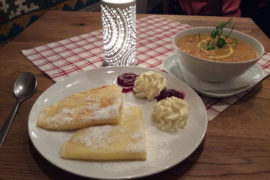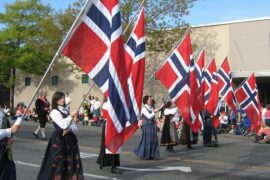For those learning a new language or traveling abroad, finding ways to say ‘hello’ to the locals is the gateway to striking up conversations, meeting new friends, and broadening vocabulary.

There are quite a few different ways to greet people in Norwegian, and the phrase you use will depend a lot on the context you find yourself in.
Don’t let this deter you, though. Once you get the hang of the basic ‘hello’ phrases, you’ll be ready to hit it off with the lovely people of Norway in no time!
Casual ways to greet someone in Norwegian
Hei (and other ways to say hi)
The most common and informal greeting you will hear in Norway is ‘hei.’
Sounds simple, right? This greeting, which you may have already guessed, means ‘hi!’
‘Hei’ can be used with anyone, and at any time of the day.
You may also hear ‘hei hei.’ Norwegians (and Scandinavians in general) sometimes like to say things twice!
Heisann isn’t as common as saying ‘hei,’ and may sound more informal depending on where in Norway you are (and what the context is).
In some cases, ‘heisann’ is also used when something unexpected or surprising happens.
Hei på deg translates literally as ‘hi on you!’, which can seem unusual to English speakers, but is really just a very friendly way to greet someone.
Hallo
‘Hallo’ is another very common greeting in Norwegian, which means ‘hello!’
You would use this in the same way you use ‘hello’ in English. When someone calls you on the phone, you might answer with ‘Hallo?’
More formal ways to say hello
Norwegian society is not very hierarchical and to be honest, it’s unlikely that you’d ever need to stray from the casual greetings we listed above.
Even in business meetings and academic settings, a simple ‘hei’ will do just nicely.
If you’re really trying to make a good impression though (and don’t mind coming off as overly formal) you could try something like ‘God morgen, frue’ (good morning, madam) or ‘God aften, herre’ (good afternoon, sir).
To be blunt about it, there is really not a context we can think of where this wouldn’t be a bit cringe, so yeah. Maybe just say hei.

Greetings throughout the day
God morgen
Equivalent to ‘good morning,’ ‘god morgen’ is a casual way to greet someone in the earlier hours of the day.
If you want to sound like a real native, you can say ‘mårn/morn’ which is just a shortened version of ‘god morgen.’
God dag
‘God dag’ directly translates to ‘good day.’ It’s more formal than saying ‘hei’ or ‘hallo,’ but is still a very general greeting used during mid-day.
God eftermiddag
‘God eftermiddag’ means ‘good afternoon.’ This one is also more formal, therefore you probably wouldn’t say it to your close friends and family. But a great way to say hello to a store clerk, or an acquaintance.
God kveld
Used during the later hours of the day, ‘god kveld,’ meaning ‘good evening,’ is a polite way to greet someone when the sun is descending.
How do people reply, once you say hello?
In most countries, when someone says hello to you, you can get away with just repeating the same word or phrase back to them.
For example, in English you can say: “Good morning” as soon as someone says “Good morning” to you. But it can be a bit weird if you always do it. (Imagine answering “Hi there!” when someone else says “Hi there!”)
Norwegian is no different. You can safely repeat ‘Hei’ to someone, or even ‘Hei hei’.
But you might not want to reply to ‘Har du det bra?’ (Are you doing well?) with the same phrase again.
“Thank you for last time”
If you’re a native English speaker, the phrase ‘Takk for sist’ can be a strange concept to get your head around.
It roughly translates as “Thanks for the nice time we had together last time that I saw you” and is normally used right after saying hello, to politely acknowledge that you enjoyed that person’s company last time you saw them.
A good example is this: you saw a friend in July and ate dinner at their house. Then next time you saw them, say, in September, they might say: ‘Hei, takk for sist!’ and give you a hug or shake your hand.
This casual linking together of previous meetings is not a thing that Brits or Americans do (at least, not so succinctly) but it is nice to experience, once you understand how it works.
‘How are you?’ in Norwegian
There are a few ways to say ‘how are you’ in Norwegian, and you may hear different variations of the same phrase. Let’s go over the common ones:
Hvordan har du det?
The phrase ‘hvordan har du det’ means ‘how are you,’ ‘how are you doing,’ or ‘how do you do?’ This phrase is rather formal and is mostly used in a respectful manner.
Hvordan går det (med deg)?
‘Hvordan går det’ is like saying ‘how’s it going?’ If you add the ‘med deg’ at the end, it becomes ‘how’s it going with you?’ This one is less formal and is used among friends and family.
Går det bra?
‘Går det bra’ means ‘are you doing well?’ Or ‘is it going well (with you)?’
Har du det bra?
This one is very similar to ‘går det bra?’ ‘Har du det bra’ translates to ‘do you have it good?’
Hva skjer?
This one is quite informal and usually said to greet friends, ‘hva skjer’ is a friendly ‘what’s up!?’ Or ‘what’s going on!?’
If you really want to sound like a local, you can throw on a ‘a’ at the end of this phrase. This then becomes ‘hva skjer’a?’
Bonus phrases and slang greetings in Norwegian
| Norwegian phrase | English translation |
| Hvordan er dagen din? | How is your day? |
| Det er hyggelig å møte deg | It’s nice to meet you |
| Det er hyggelig å se deg igjen | It’s nice to see you again |
| Hvordan har du hatt det? | How have you been? |
| Står til? | What’s up? (slang) |
| Yo! | Yo (slang) |
| Halla | Hi/hello (slang) |
| Hei folkens | Hi guys |
| Halla folka | Hi guys (slang) |
| Halla kare | Hi guys (slang) |
| Hei vennen | Hi (to a friend) |
| Hei alle sammen | Hi everyone |
| Hei nydelig | Hi beautiful |
| Hei der | Hi there |
| Velkommen | Welcome |
Now that you’ve learned how to say hello in Norwegian, you are one step closer to befriending the kind people of this country.
Norwegians will definitely appreciate you trying to speak their beautiful language, so don’t be shy! Get out there and use what you’ve learned. Lykke till!
See also:
Nordic vs Scandinavian: what is the difference
Popular Norwegian boys’ names
How many people speak Swedish?









